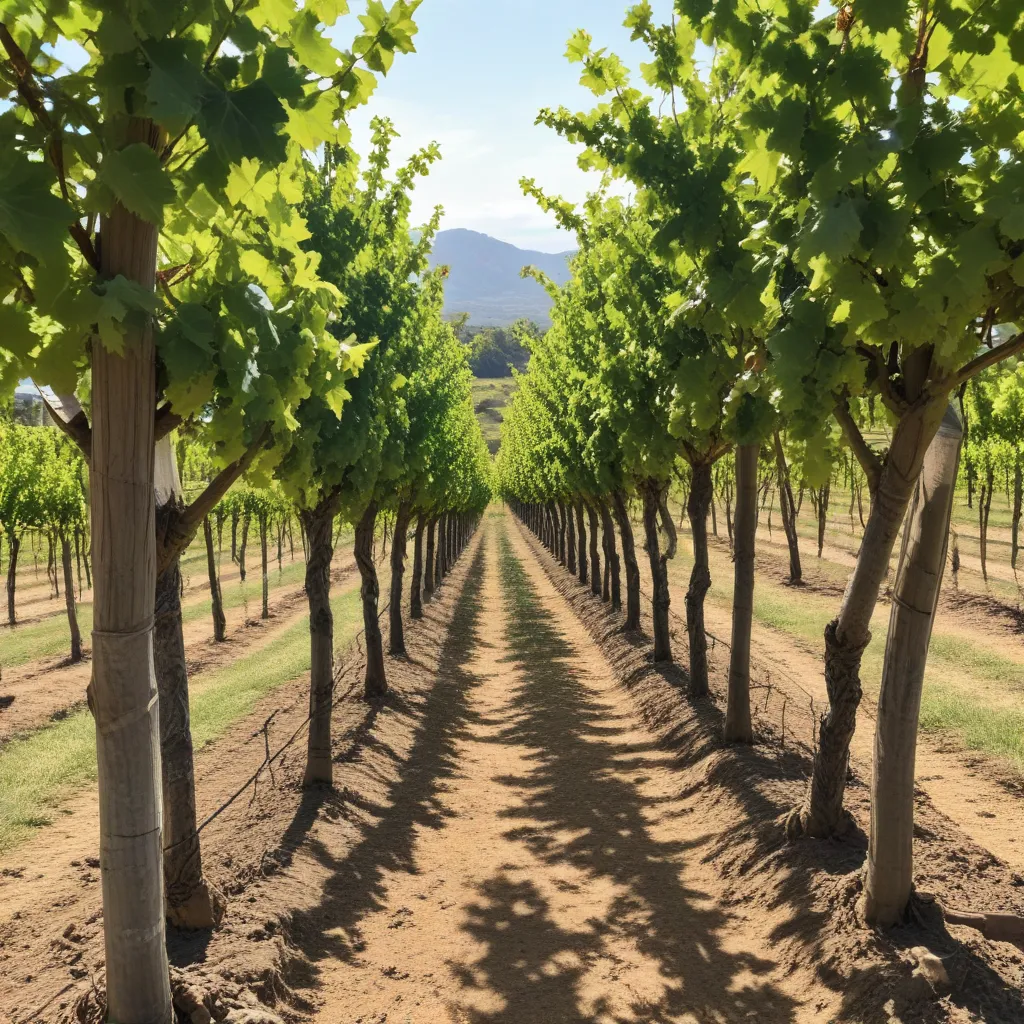
At the Wine Garden Inn, our unwavering commitment to sustainability permeates every aspect of our operations – from meticulous vineyard management to innovative winemaking techniques. As stewards of this land, we take great pride in our estate’s eco-friendly practices, which not only enhance the quality of our wines but also contribute to the long-term health and resilience of our local environment.
Vineyard Management Strategies
Organic Farming Techniques
At the heart of our sustainable approach lies our adoption of organic farming methods. By eschewing the use of harsh chemicals and synthetic fertilizers, we cultivate a vibrant, self-sustaining ecosystem in our vineyards. Our skilled viticulturists employ a range of organic amendments, such as compost and cover crops, to nourish the soil and promote the growth of beneficial microorganisms. This holistic approach not only produces superior-quality grapes but also helps to sequester carbon, support local biodiversity, and safeguard the integrity of our precious water resources.
Integrated Pest Management
Our commitment to sustainability extends to our pest control strategies as well. Rather than relying on broad-spectrum pesticides, we employ integrated pest management (IPM) techniques that leverage natural predators and ecological balance to keep harmful pests at bay. By carefully monitoring our vineyards and introducing beneficial insects, such as ladybugs and lacewings, we’ve been able to significantly reduce our chemical inputs while ensuring the health and vitality of our vines.
Water Conservation Methods
Water is a precious commodity, especially in our sun-drenched region, and we take great care to steward this vital resource responsibly. Our vineyards are equipped with drip irrigation systems that deliver water directly to the rootzone, minimizing evaporation and ensuring optimal water usage. Additionally, we’ve invested in soil moisture sensors and weather stations to fine-tune our irrigation schedules, allowing us to respond precisely to the changing needs of our vines.
Renewable Energy Initiatives
Solar Power Integration
In our ongoing pursuit of sustainability, we have integrated solar power into our winemaking operations. Expansive photovoltaic arrays now cover the roofs of our production facilities, generating a significant portion of the electricity needed to power our crush pad, fermentation tanks, and barrel rooms. This renewable energy source not only reduces our carbon footprint but also insulates us from the fluctuations of the traditional power grid, ensuring the reliability of our operations.
Biofuel Utilization
To further minimize our reliance on fossil fuels, we have embraced the use of biofuels to power our vineyard equipment and delivery vehicles. These plant-based fuels, derived from sustainable sources such as recycled cooking oil, allow us to significantly reduce our greenhouse gas emissions while supporting the development of a more circular economy.
Wind Energy Implementation
Recognizing the potential of wind power, we have also begun to explore the integration of wind turbines into our energy mix. By harnessing the natural breezes that flow through our vineyards, we aim to generate additional renewable electricity to offset our energy needs and further diminish our carbon footprint.
Soil Health Preservation
Nutrient Cycling
Healthy, vibrant soil is the foundation of our sustainable viticulture practices. To maintain and enhance the fertility of our vineyards, we have implemented robust nutrient cycling strategies. By composting our grape pomace, prunings, and other organic matter, we are able to reintroduce vital nutrients back into the soil, nourishing the vines and promoting the growth of beneficial microorganisms.
Erosion Control
Recognizing the importance of soil preservation, we have implemented a range of erosion control measures to safeguard our precious topsoil. This includes the strategic planting of cover crops, which help to stabilize the soil, and the construction of terraces and windbreaks to mitigate the effects of heavy rains and strong winds.
Cover Cropping
The strategic use of cover crops is a cornerstone of our soil management approach. By cultivating a diverse array of plant species between our vine rows, we not only enhance the soil’s nutrient content and water-holding capacity but also provide a habitat for a wide range of beneficial insects and microorganisms. This holistic approach to soil health ensures the long-term viability of our vineyards and the quality of our grapes.
Biodiversity Enhancement
Native Plant Cultivation
In our ongoing efforts to promote biodiversity, we have dedicated significant resources to the cultivation of native plant species throughout our vineyard. By integrating these hardy, drought-tolerant plants into our landscape, we’re able to create a thriving ecosystem that supports a diverse array of pollinators, birds, and other wildlife. This not only enhances the ecological balance of our estate but also contributes to the overall beauty and resilience of our surroundings.
Habitat Restoration
Beyond our vineyard boundaries, we have also undertaken initiatives to restore and protect important wildlife habitats. This includes the reintroduction of native grasses and the creation of wetland areas that provide crucial resources for migratory birds and other local fauna. By taking a holistic, landscape-level approach to conservation, we’re able to safeguard the delicate balance of our ecosystem and ensure the long-term sustainability of our operations.
Wildlife Corridors
To further support biodiversity, we have established strategic wildlife corridors that allow for the safe passage of animals through our property. These interconnected pathways, lined with native vegetation, provide crucial linkages between fragmented habitats, enabling the free movement of species and promoting the overall health of our local ecosystem.
At the Wine Garden Inn, our commitment to sustainable viticulture is not just a lofty goal – it’s a way of life. By embracing a holistic, nature-based approach to vineyard management, renewable energy, soil health, and biodiversity enhancement, we are not only crafting exceptional wines but also playing a vital role in the stewardship of our land and the preservation of our local environment. Join us as we continue our journey towards a more sustainable future, where the art of winemaking and the preservation of our natural resources go hand in hand.
